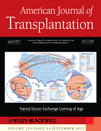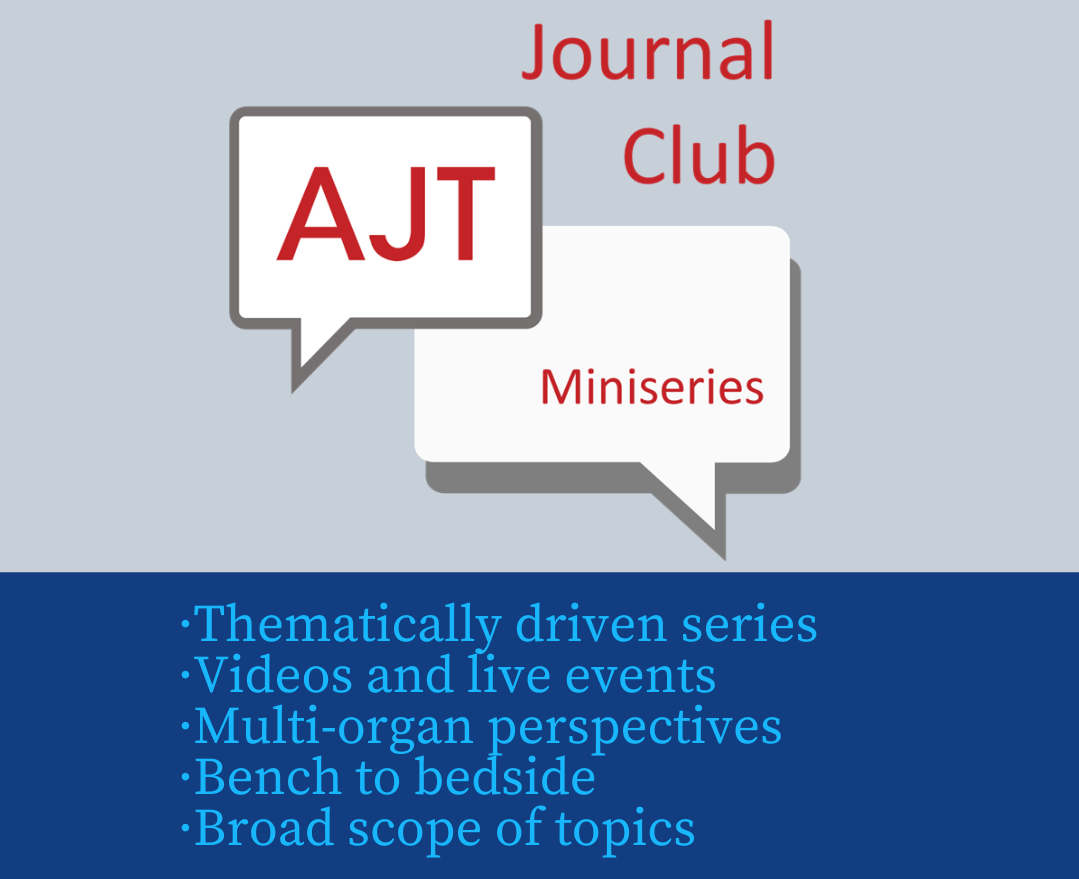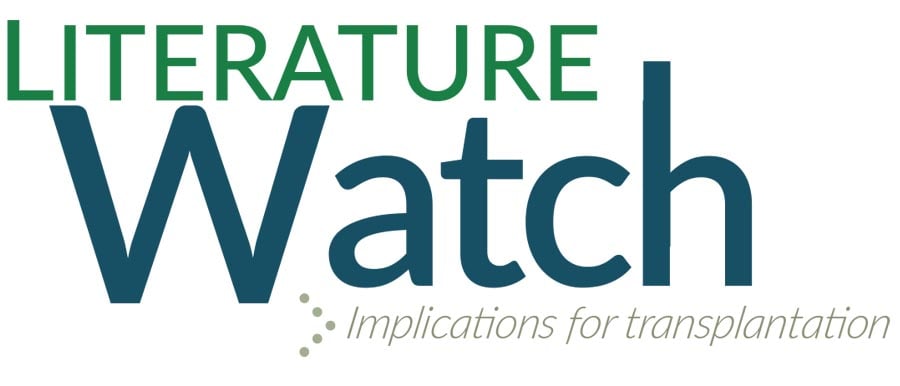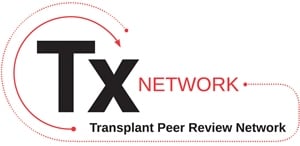Journal list menu
Export Citations
Download PDFs
The AJT Report
The AJT Report: News and issues that affect organ and tissue transplantation
- Pages: 2263-2264
- First Published: 27 August 2012
Researchers are studying new high-tech solutions to help improve medication adherence, self-management skills and overall health outcomes in transplant patients.
Literature Watch
LITERATURE Watch: Implications for transplantation
- Page: 2265
- First Published: 27 August 2012
Recent studies suggest that mast cells function in a broad spectrum of immune and nonimmune responses, which may fundamentally change our perceptions about how peripheral tolerance or homeostasis is induced and maintained.
Editorials
Reducing Complications in Pediatric Liver Transplantation: Do We Have the Answer?
- Pages: 2267-2268
- First Published: 27 August 2012
This editorial accompanies a paper describing a quality initiative in pediatric liver transplant and points out the pitfalls in quality-based guidelines both specific to the Englesbe report (page 2301) and generic in the field of quality.
Costimulation Blockade—A Double-Edged Sword?
- Pages: 2269-2270
- First Published: 27 August 2012
The author describes the findings of Riella et al (see April issue) and Charbonnier et al (see page 2313) that CTLA4Ig worsens outcomes in regulatory T cell–dependent models of transplantation and discusses how these findings may impact future research and clinical use of related drugs.
Perspectives on Lung Transplantation and Donation-After-Determination-of-Cardiac-Death Donors
- Pages: 2271-2272
- First Published: 27 August 2012
An Australian collaborative report confirms that the regular use of donation-after-determination-of-cardiac-death lungs is both feasible and underutilized. See article by Levvey et al on page 2406.
Minireviews
Informed Consent for Living Donation: A Review of Key Empirical Studies, Ethical Challenges and Future Research
- Pages: 2273-2280
- First Published: 17 May 2012
This review highlights challenges to informed consent for both live kidney donors and live liver donors, and situates trends within broader policy contexts, ethical debates and avenues for future innovative research.
Hepatitis E Virus: What Transplant Physicians Should Know
- Pages: 2281-2287
- First Published: 30 April 2012
In organ transplant recipients, hepatitis E virus may be responsible for chronic hepatitis and extra-hepatic manifestations that can require specific antiviral therapy.
Meeting Report
Diagnosis and Management of Tuberculosis in Transplant Donors: A Donor-Derived Infections Consensus Conference Report
- Pages: 2288-2300
- First Published: 06 August 2012
This consensus report reviews current epidemiology and diagnostic testing for the identification of latent and active tuberculosis infection in deceased and living organ transplant donors and provides recommendations for the management of transplant donors and recipients, as well as suggested areas for future research.
Personal Viewpoints
Reducing Pediatric Liver Transplant Complications: A Potential Roadmap for Transplant Quality Improvement Initiatives Within North America
- Pages: 2301-2306
- First Published: 06 August 2012
This viewpoint describes a multi-institutional quality collaborative approach within the Studies in Pediatric Liver Transplantation group and may represent a useful framework for physician-driven, broad-based quality improvement within transplantation. See editorial by Emond on page 2267.
Preventable Errors in Organ Transplantation: An Emerging Patient Safety Issue?
- Pages: 2307-2312
- First Published: 15 June 2012
The authors provide examples of several recent high-profile patient safety events linked to system and process weaknesses and suggest that the transplant community needs to embrace the implementation of evidence-based system and process improvements to effectively mitigate existing safety vulnerabilities.
Original Articles
Basic Science
CTLA4-Ig Restores Rejection of MHC Class-II Mismatched Allografts by Disabling IL-2-Expanded Regulatory T Cells
- Pages: 2313-2321
- First Published: 03 July 2012
CTLA4-Ig promotes CD4-mediated allograft rejection by counteracting a regulatory T cell–based protocol for tolerance induction. See editorial by Maltzman on page 2269.
Lymphotoxin-Beta Receptor Blockade Induces Inflammation and Fibrosis in Tolerized Cardiac Allografts
- Pages: 2322-2334
- First Published: 17 May 2012
Lymphotoxin-beta receptor blockade induces inflammation with neutrophils and CD8 T cells, and fibrosis in tolerized cardiac allografts.
Donor-Specific CD8+Foxp3+ T Cells Protect Skin Allografts and Facilitate Induction of Conventional CD4+Foxp3+ Regulatory T Cells
- Pages: 2335-2347
- First Published: 08 June 2012
Alloantigen-specific CD8+Foxp3+ regulatory T cells exert their suppressive function by inducing the down-regulation of costimulatory molecules on CD11c+CD8α+ dendritic cells and facilitating the conversion of naïve CD4+ T cells into CD4+CD25+Foxp3+ cells.
Cyclophilin A and Nuclear Factor of Activated T Cells Are Essential in Cyclosporine-Mediated Suppression of Polyomavirus BK Replication
- Pages: 2348-2362
- First Published: 29 May 2012
Cyclophilin A and the nuclear factor of activated T cells are shown to be essential in cyclosporine-mediated suppression of polyomavirus BK replication.
Protective Effects of Transgenic Human Endothelial Protein C Receptor Expression in Murine Models of Transplantation
- Pages: 2363-2372
- First Published: 08 June 2012
Transgenic human endothelial protein C receptor expression protects against thrombosis and inflammation in mouse models of transplantation.
Localization of Mesenchymal Stromal Cells Dictates Their Immune or Proinflammatory Effects in Kidney Transplantation
- Pages: 2373-2383
- First Published: 29 May 2012
In a murine kidney transplant model, posttransplant MSC infusion causes premature graft dysfunction and fails to prolong graft survival, while pretransplant MSC infusion induces a significant prolongation of kidney graft survival by a regulatory T cell–dependent mechanism.
Permanent CNI Treatment for Prevention of Renal Allograft Rejection in Sensitized Hosts Can Be Replaced by Regulatory T Cells
- Pages: 2384-2394
- First Published: 15 June 2012
Adoptive transfer of green fluorescent protein expressing alloreactive memory CD4+ and CD8+ T cells 7 or even 100 days prior to kidney transplantation elicits an acute rejection refractory to T cell depletion, which can only be prevented by permanent cyclosporine A therapy or a combined treatment of cyclosporine A and regulatory T cells.
Enhanced De Novo Alloantibody and Antibody-Mediated Injury in Rhesus Macaques
- Pages: 2395-2405
- First Published: 09 July 2012
Homeostatic repopulation of CD4+ memory T cells enhances early alloantibody production and antibody-mediated renal allograft injury in CD3-specific immunotoxin-treated rhesus macaques.
Clinical Science
Excellent Clinical Outcomes From a National Donation-After-Determination-of-Cardiac-Death Lung Transplant Collaborative
- Pages: 2406-2413
- First Published: 23 July 2012
This article describes excellent clinical outcomes following a large multicenter Australian Collaborative series of Maastricht category III donation-after-determination-of-cardiac-death donor lung transplants. See editorial by Love on page 2271.
Donor-Derived Fungal Infections in Organ Transplant Recipients: Guidelines of the American Society of Transplantation, Infectious Diseases Community of Practice
- Pages: 2414-2428
- First Published: 13 June 2012
This document presents the guidelines endorsed by the American Society of Transplantation regarding the characteristics, diagnostic evaluation and approach to the management of donor-derived fungal infections in organ transplant recipients.
Chain Transplantation: Initial Experience of a Large Multicenter Program
- Pages: 2429-2436
- First Published: 19 July 2012
The authors report on the largest series of kidney chain transplants, which includes 54 nondirected donors and 272 recipients of whom 46% are ethnic minorities and 63% received shipped grafts from other centers.
Kidney Function and Risk of Cardiovascular Disease and Mortality in Kidney Transplant Recipients: The FAVORIT Trial
- Pages: 2437-2445
- First Published: 17 May 2012
In stable kidney transplant recipients participating in the FAVORIT Trial, lower estimated glomerular filtration rate, beginning at a level of 45 ml/min per 1.73 m2, is independently associated with cardiovascular disease events and all-cause mortality, suggesting that reduced kidney function itself may directly lead to cardiovascular disease independent of preexisting comorbidities.
Randomized Phase 2b Trial of Tofacitinib (CP-690,550) in De Novo Kidney Transplant Patients: Efficacy, Renal Function and Safety at 1 Year
- Pages: 2446-2456
- First Published: 08 June 2012
The authors present the results of a phase 2b trial of tofacitinib in renal transplantation.
Cytomegalovirus Replication Kinetics in Solid Organ Transplant Recipients Managed by Preemptive Therapy
- Pages: 2457-2464
- First Published: 17 May 2012
The authors show that preemptive antiviral therapy is an effective approach for control and prevention of cytomegalovirus replication after renal and liver transplantation, even in high-risk patients.
Liver Retransplantation in HIV-Infected Patients: A Prospective Cohort Study
- Pages: 2465-2476
- First Published: 15 June 2012
HIV-infected liver transplant patients have lower survival after liver retransplantation than matched HIV-negative liver retransplanted recipients; however, HIV-infected patients with undetectable HCV RNA at retransplantation or undergoing late retransplantation have a more favorable outcome, similar to that in their HIV-negative counterparts.
Hypothermic Machine Preservation Reduces Molecular Markers of Ischemia/Reperfusion Injury in Human Liver Transplantation
- Pages: 2477-2486
- First Published: 17 May 2012
The authors report that hypothermic machine preservation of 20 transplanted human livers resulted in down-regulation of a variety of molecular markers of ischemia/reperfusion injury compared to standard cold storage control cases.
Randomized Controlled Trial of Sirolimus Conversion in Cardiac Transplant Recipients With Renal Insufficiency
- Pages: 2487-2497
- First Published: 09 July 2012
This randomized, comparative, multinational study of cardiac transplant recipients with mild to moderate renal insufficiency shows that conversion to sirolimus from calcineurin inhibitor therapy significantly improves renal function but with an attendant risk of acute rejection.
Benchmarking in the Process of Donation After Brain Death: A Methodology to Identify Best Performer Hospitals
- Pages: 2498-2506
- First Published: 08 June 2012
The authors provide a detailed description of a benchmarking methodology that allows the identification of best performer hospitals in the process of donation after brain death.
Brief Communications
Continuously Evaluating Performance in Deceased Donation: The Spanish Quality Assurance Program
- Pages: 2507-2513
- First Published: 15 June 2012
The Spanish Quality Assurance Program applied to the process of donation after brain death represents a systematic, continuous and sustainable approach for a comprehensive assessment of this process, allowing for the estimation of the potential of donation, the analysis of performance and the identification of areas for improvement.
Brain Death Determination in Israel: The First Two Years Experience Following Changes to the Brain Death Law—Opportunities and Challenges
- Pages: 2514-2518
- First Published: 17 May 2012
An analysis of changes made to the Brain Death Act in Israel accommodating requirements of the religious authorities reveals many obstacles to brain death determination.
Changes in Neurocognitive Functioning Following Lung Transplantation
- Pages: 2519-2525
- First Published: 30 April 2012
Data provided by 49 patients who completed neuropsychological tests before and 6 months following lung transplantation suggest that verbal memory may improve after lung transplantation, whereas executive function may improve for younger patients but decline for older patients.
Bortezomib for Acute Antibody-Mediated Rejection in Liver Transplantation
- Pages: 2526-2531
- First Published: 08 June 2012
This study reviews three cases of acute antibody-mediated rejection in ABO-compatible liver transplant recipients treated with proteasome-inhibitor therapy (bortezomib) with remarkable clinical, immunologic and histologic outcomes.
Low-Dose IL-2 for In Vivo Expansion of CD4+ and CD8+ Regulatory T Cells in Nonhuman Primates
- Pages: 2532-2537
- First Published: 08 June 2012
Low-dose IL-2 therapy significantly expands functional CD4+ and CD8+ regulatory T cells in the peripheral blood with limited expansion of non-Treg cells in nonhuman primates.
Case Reports
Learning Curve in Tracheal Allotransplantation
- Pages: 2538-2545
- First Published: 08 June 2012
The authors describe optimal approaches to tracheal revascularization, transplantation and withdrawal of immunosuppression in four tracheal allotransplantation cases.
Antibody Mediated Rejection Associated With Complement Factor H–Related Protein 3/1 Deficiency Successfully Treated With Eculizumab
- Pages: 2546-2553
- First Published: 08 June 2012
Eculizumab is successful in treating severe antibody-mediated rejection in a kidney transplant recipient with CFHR1 deletion, highlighting a promising new treatment strategy for this condition and raising the possibility that CFHR1 deficiency may predispose or aggravate posttransplant antibody-mediated rejection.
Reports From the CDC: MMWR
FDA Approval of an Extended Period for Administering VariZIG for Postexposure Prophylaxis of Varicella
- Page: 2554
- First Published: 27 August 2012
The recommendation for timing of administration of varicella immune globulin to nonimmune immunosuppressed hosts who have a significant exposure has been extended from 4 to 10 days following exposure.
Book Review
Cardiovascular Diseases and Liver Transplantation edited by Zoka Milan
- Page: 2555
- First Published: 23 July 2012
Images in Transplantation
CME
Fever, Hepatosplenomegaly and a Skin Nodule in a Kidney–Pancreas Transplant Recipient
- Pages: 2556-2558
- First Published: 27 August 2012
Letters to the Editor
Primary Intrarenal Posttransplant Lymphoproliferative Disorder Detected by Surveillance Protocol Biopsy
- Pages: 2559-2560
- First Published: 15 June 2012
Does Everolimus Increase Donor-Specific HLA Antibodies in Kidney Transplant Recipients?
- Pages: 2561-2562
- First Published: 19 July 2012
Immunosuppressive Potential and Side Effects of Everolimus
- Page: 2563
- First Published: 27 August 2012










.jpg)
